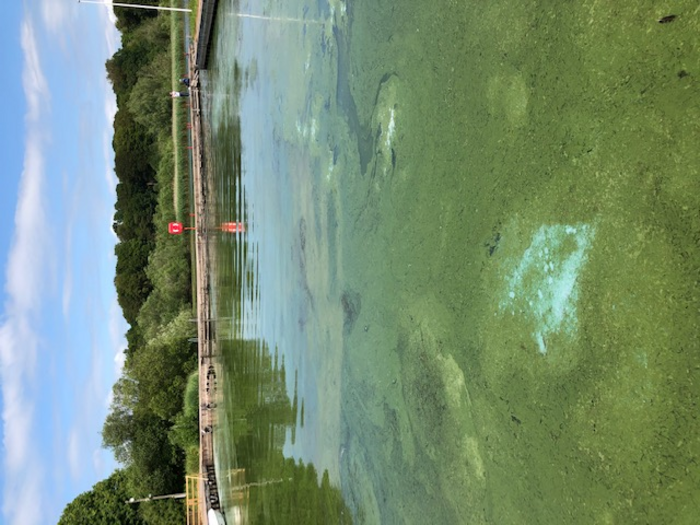An online portal to help local people, policy-makers and regulators understand the ecology of Loch Leven better is being launched today by the UK Centre for Ecology & Hydrology (UKCEH).

Credit: Linda May
An online portal to help local people, policy-makers and regulators understand the ecology of Loch Leven better is being launched today by the UK Centre for Ecology & Hydrology (UKCEH).
Situated in Perth and Kinross, Loch Leven is the largest shallow loch in lowland Scotland and is of international importance as a brown trout fishery, wildlife haven and recreational site.
The Loch Leven portal provides current and historical information about the loch, together with an array of useful resources for schools.
By sharing high quality data on the past and current condition of the loch, the portal will ensure that decisions on how to protect, maintain and manage the loch for the benefit of people and nature are based on strong evidence. These decisions include how to reduce toxic algal blooms.
Loch Leven hosts one of the longest running lake monitoring programmes in the world and the data being made available through the portal are extensive. UKCEH and its predecessors have been sampling Loch Leven every two weeks, all year round, since 1968. Also, every ten years since 1985, UKCEH has carried out detailed weekly assessments, over a 12-month period of the amount of nutrients entering the loch from its catchment. The next survey is due in 2025.
Excess amounts of nutrients – such as nitrogen and phosphorus – can lead to a rapid accumulation (bloom) of blue-green algae (cyanobacteria) in all types of lakes, and this has been a well-documented problem at Loch Leven since the 1970s. Blue-green algae have a serious detrimental effect on water quality, not least because some species produce toxins that can cause health problems if touched or swallowed. These include skin rashes, nausea and vomiting, and diarrhoea. These toxins can be particularly dangerous to dogs, if ingested.
The nutrients that fuel algal growth come from a variety of sources. These include agricultural runoff, industrial discharges, and effluent from septic tanks and other types of wastewater treatment systems. In the 1980s and 1990s, massive outbreaks of blue-green algae at Loch Leven were tackled by working with farmers, Scottish Water and the local planning department to reduce the levels of nutrients entering the loch. This improved water quality.
However, additional steps are likely to be needed to tackle the current increase in blue-green algae. This is because climate change is making the loch more sensitive to these nutrients. For example, higher temperatures are causing phosphorus that has been stored in the loch sediments over many years to be recycled back into the water. This increases nutrient levels and encourages the algae to grow. A recent report published by the Centre of Expertise for Waters (CREW) shows that this problem is occurring across Scotland and is not specific to Loch Leven.
Dr Linda May, a freshwater ecologist at UKCEH, who leads the Loch Leven long-term monitoring programme, said: “Blue-green algal growth can be caused by a variety of factors, so it is often difficult to find the right solution to the problem. We hope that, by sharing the Loch Leven data through this portal, we can provide high-quality data to ensure that well-informed decisions are made about measures to reduce these algal blooms.”
The portal will provide an overview of the changing environmental conditions at Loch Leven, with the full data sets available on request for those who require more detail.
As well as being important for the management of the loch at a local level, the data collected at Loch Leven are of national and international significance, according to Dr May.
“Loch Leven is one of a small number of lakes around the world that have this level of detailed, long-term monitoring in place”, she said. “Analysing and comparing the data that we are gathering helps us understand how lake ecosystems are responding to change, given the multiple environmental, climatic and human pressures they face. This knowledge can then inform evidence-based decisions on the restoration and sustainable management of similar lakes worldwide.”
UKCEH collect data on Loch Leven through the UK-SCAPE programme, a National Capability initiative funded by the Natural Environment Research Council, part of UK Research and Innovation. The Loch Leven portal was funded by the William Grant Foundation, which supports numerous environmental and community projects across Scotland.
ENDS
About the UK Centre for Ecology & Hydrology
The UK Centre for Ecology & Hydrology (UKCEH) is a centre for excellence in environmental science across water, land and air. Our 600+ scientists work to understand the environment, how it sustains life and the human impact on it – so that, together, people and nature can prosper. We have a long history of investigating, monitoring and modelling environmental change, and our science makes a positive difference in the world.
For interviews and further information, contact:
Jo Kelly, Campus PR, T: +44 (0)7980 267756 E: [email protected]
Anthea Milnes, Head of Communications and Engagement at UKCEH, [email protected] or +44 (0)7920 295384




